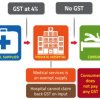.jpg)
PETALING JAYA: Private hospital operators in the final business-to-consumers (B2C) supply chain are likely to implement a cost-push formula to counter the higher input-cost effects from the goods and services tax (GST).
According to industry observers, this would be the most likely scenario as rising medical costs was more cost-led than demand-led.
Private hospitals are already in talks with the Finance Ministry on how to handle the impending GST, given that the operators at the final B2C healthcare supply chain would not be able to claim these additional input costs earlier in the supply chain due to the sector being “tax-exempt”.
This would see the outcome from the discussions either going the way of the higher cost being passed on to the consumer or the B2C players absorbing the costs.
Industry analysts say the former was more likely, given the historical trends and the economic situation of the country.
CIMB Research’s Saw Xiao Jun told StarBiz he expected costs to be eventually passed through for private and listed hospital operators such as IHH Healthcare Bhd and KPJ Healthcare Bhd.
“In the medium term, higher costs will affect the growth in demand for private healthcare, due to slower income growth and the higher cost of living. Should private hospitals decide to raise their charges, this could impact patient volume. But if they choose to absorb the higher costs to attract patients, their profit margin will be affected,” Saw said.
“So far, there is no clear guidance on the items affected by the GST. Despite healthcare (in general) being classified as ‘GST-exempt’, there are different components that make up the bill such as doctor’s consultation, drugs and medical supplies. The Government may decide to categorise certain items as GST-exempt while other items such as medical supplies may not be exempted,” Saw added.
Public Invest Research’s healthcare analyst Siew Jin Ling said in an earlier report that though hospitals would be unable to impose GST on patients for medical treatments, medical supplies and drugs procured by the hospitals would still be subject to the tax.
“This would translate to higher costs for healthcare providers. Nonetheless, we believe they will not bear the full brunt of the costs as it is likely to be passed on in the form of higher fees,” Siew said.
Press reports had earlier quoted the Association of Private Hospitals of Malaysia (APHM) president Datuk Dr Jacob Thomas as saying it was impossible for hospitals to absorb GST when the cost of goods would increase.
“If there is an additional cost, it will definitely be passed to patients. Currently, there is no tax if we use a third party for housekeeping and food services, But after the GST is implemented, we will have to pay tax,” Jacob was earlier quoted as saying.
APHM had estimated that healthcare costs would eventually rise by between 4% and 5% as medical supplies such as rubber gloves were subject to the GST.
Private healthcare operators listed on Bursa Malaysia are IHH Healthcare, KPJ Healthcare and TMC Life Sciences Bhd.
Shares in these companies have largely remained intact despite news of the latest developments in the local healthcare sector and are still holding up their hefty valuations compared with the benchmark FTSE Bursa Malaysia KL Composite Index.
CIMB’s Saw wrote in a recent report that he continued to remain “overweight” on the overall sector with a general preference for IHH than KPJ as the former was less exposed to Malaysian hospitals.
Saw noted that subsidy cuts and the GST implementation would hit the middle class the hardest and that private players like KPJ which target this income group may find it harder to attract patients away from the almost-free public hospitals.
He further noted that private hospital bills were set to rise further in the next two years with the GST and the higher cap on doctors’ consultation fees.
The question on affordability would then arise given that private hospital bills had traditionally been paid by the patients themselves rather than through insurance.
CIMB’s Saw has a “hold” recommendation on KPJ with a target price of RM3.48 and an “add” call on IHH with a target price of RM4.72. Public Invest’s Siew is neutral on KPJ with a target price of RM3.62 and was also neutral on IHH with a target price of RM3.94. TMC is not covered by any research house at the moment.
Source:The Star

